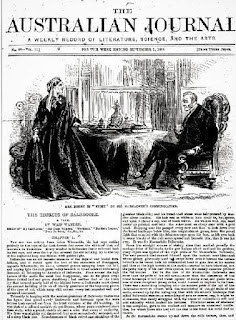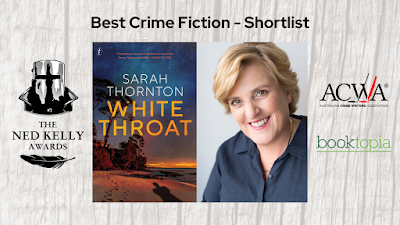 |
| A wonderful array of Australian storytellers comprise this year's shortlist for the Ned Kelly Award for Best Crime Fiction. Some world class crime writing from lands Downunder |
Craig every second Tuesday.
Kia ora and gidday everyone.
So since my last post the shortlists were announced for this year's Ned Kelly Awards, which are Australia's national crime writing prizes. They're named after an infamous bush ranger (aka rural outlaw) who famously wore a suit of protective armour while in a shootout with police in the nineteenth century, Ned Kelly remains a figure both divisive and romanticised in Australia, akin to famed outlaws like Billy the Kid and others from the Old West.
The Ned Kelly Awards - which are fashioned as an impression of the metal helmet Ned Kelly wore while battling police - were established in 1996 by the Australian Crime Writers Association "to reward excellence in the field of crime writing within Australia". So this year is the 25 year anniversary of the first awards, where the Best Novel prize was shared by Barry Maitland for MALCONTENTA and Paul Thomas for INSIDE DOPE, Best First Novel prize was won by John Dale for DARK ANGEL, and Jon Cleary was given the Lifetime Achievement Award.
 |
| Sulari Gentill, shortlisted for this year's Ned Kelly Award for Best Crime Fiction for her latest historical mystery, won in 2018 for her standalone meta-thriller CROSSING THE LINES |
At the time, Cleary had written 12 crime novels (among other novels and screenplays) starring Sydney detective Scobie Malone - the first, THE HIGH COMMISSIONER, was published in 1966. He'd eventually write 20 Scobie Malone novels before his passing in 2010, the finale being DEGREES OF CONNECTION in 2003.
That final Cleary novel won the Ned Kelly Award for Best Crime Novel, too. Cleary was writing at a time when it was relatively rare for crime novels to be set in Australia (Peter Corris with his Cliff Hardy series was another early pioneer), and even until recent years I've heard stories of Australian novelists being discouraged by publishers or agents from setting their books in their homeland in case the don't sell like US or UK-set crime.
Another example of the famous saying from novelist and legendary Hollywood screenwriter William Goldman (re Hollywood but often it could equally apply to publishing): "Nobody Knows Anything".
While Australia's crime writing award have been around for a quarter of a century, and that country (like Ireland, New Zealand, and Scandinavia, among others) seems to be going through a modern crime writing gold rush, the literary ancestors of this year's Ned Kelly shortlistees date back to the earliest days of the genre we love.
 |
| A scene from the 2012 television adaptation of Fergus Hume's 1886 novel THE MYSTERY OF A HANSOM CAB, the first global blockbuster of detective fiction |
As I mention in the introduction to SOUTHERN CROSS CRIME, if you're looking for a good pub quiz question for mystery lovers, "What was the bestselling detective novel of the nineteenth century?" may be a good one.
Even big mystery fans are likely to guess something like A STUDY IN SCARLET, the first Sherlock Holmes novel, or perhaps THE MOONSTONE by Wilkie Collins (I would have until several years ago). But the answer is in fact THE MYSTERY OF A HANSOM CAB (1886) by Fergus Hume, a still enjoyable tale set on the streets of 'Marvellous Melbourne', a booming gold rush city where wealth and poverty rubbed up against each other. It significantly outsold the early Sherlock Holmes tales at the time, much to Arthur Conan Doyle's chagrin.
As ground-breaking as Hume was on a global scale - not only did he craft the first 'global blockbuster' in detective fiction, he made his book's setting as important as a character - he wasn’t the first Australian crime writer.
 |
| Mary Fortune's pseudonymous crime tales in the Australian Journal have seen her called the world's first female detective fiction author |
Literary archaeologist Dr Lucy Sussex, who wrote an excellent book about Fergus Hume, has long championed the importance of Mary Fortune, a trailblazing pioneer who began writing from remote goldfields and could be considered not only the mother of Australian crime writing, but the mother of the police procedural in a global sense. Under the pseudonyms Waif Wander and WW, Fortune penned more than 500 stories from the viewpoint of a police detective for the popular Australian Journal between 1865 and 1908. Fortune’s use of a police narrator, her focus on realism, reliance on police procedure and ‘almost forensic depiction of violence’ predated and anticipated much of the more famous detective fiction that began emerging later in the nineteenth century, notes Sussex.
So while nowadays the tree of Australian crime writing is heavily laden with delicious fruit - as evidenced by the shortlist for this year's Ned Kelly Award for Best Crime Fiction, not to mention the many dozens of other good and great storytellers who released new books during the pandemic alone - the roots go back long and deep.
I've had the pleasure of reading all eight shortlisted authors (they're all also discussed in SOUTHERN CROSS CRIME - four feature in the in-depth interviews section - unlike their counterparts in Best Debut Crime Fiction, who first hit the shelves after my guidebook was already in production), and you can't go wrong grabbing any of them. It's a glittering array of modern Australian crime writing talent, and the Ned Kelly judges have a tough choice.
I've read and previously reviewed six of the specific books shortlisted. Here's a wee rundown of all eight contenders:
CONSOLATION by Garry Disher: the third in Garry Disher's newer rural series starring Constable Paul 'Hirsch' Hirschhausen, a cop demoted and banished from the big city to small town Tiverton. Hirsch is juggling an array of incidents, from someone stealing women's knickers to 'tradesman' conning the elderly out of their savings, a girl who may be in danger, and an enraged father who violently confronts a council worker before 'going bush' with his son and a rifle. Disher, a legend of modern Australian crime writing who won the Ned Kelly Lifetime Achievement Award in 2018, adroitly brings many threads together into a cohesive whole while giving readers a deep look at a rural community and the people who live there and pass through. CONSOLATION is a sublime tale that flows so well it'd be easy to overlook just what a triumph of a novel it is.
GATHERING DARK by Candice Fox: Sydney author Candice Fox announced herself on the crime scene several years ago when she won back-to-back Ned Kelly Awards for her debut HADES and its sequel EDEN. A prolific storyteller with a great touch for offbeat, memorable crime characters, Fox has also written the 'Crimson Lake' trilogy set in Far North Queensland (TV adaptation Troppo is currently being filmed) as well as co-writing thrillers with James Patterson. In GATHERING DARK, ex-surgeon Blair Harbour is now an ex-con working gas station night shifts. When the daughter of her ex-cellmate vanishes, she risks everything to try to help; the pair teaming with crime boss Ava Maverick and LAPD Detective Jessica Sanchez - the cop who put Blair in prison years before. Four women, all facing questions and dangers in their lives. Fox delivers an exciting storyline with some helter-skelter action and great set-pieces, but my lasting impression was the strong sense of humanity that bubbled throughout.
A TESTAMENT OF CHARACTER by Sulari Gentill: while Sulari Gentill won the Ned Kelly Award in 2018 for her meta-fiction standalone CROSSING THE LINES (aka AFTER SHE WROTE HIM) which blurs the lines between author and creation, the spine of her crime career is her historical mystery series set in the 1930s and centred on artist and amateur sleuth Rowland Sinclair. In A TESTAMENT TO CHARACTER, the 10th instalment, Rowly and his sleuthing pals Clyde, Milton, and Edna travel to Boston in the aftermath of a close friend's death. Or as it turns out, murder. Rowly & Co must find the killer while dealing with warring factions after their friend left the bulk of his fortune to an unknown man, and Rowly as the executor tasked with doling things out. As Living Arts Canberra said, "Again, Sulari Gentill has written a crime fiction novel which is so much more. The parallels with our current situation, politically and economically, are remarkable and goose-bump inducing. Highly recommended."
So, who'll win this year's Ned Kelly Award for Best Crime Fiction? Honestly, I have no idea. It's a tremendous field of contenders. I'm very curious to see which book the judges prefer. I imagine it'll be a tight decision.
If you enjoy good writing, you can't go too wrong nabbing some of the books on this list. With everything from rural to urban crime, Australian-set to overseas, historical to contemporary, there's also something there for most mystery-lovers. No matter where your tastes lie. So dive on in.
Have you read any Australian crime fiction? If so, what have been some of your favourite books? Which of this year's Ned Kelly Award contenders do you think you're most likely to add to your TBR pile?
Until next time. Ka kite anō.
Whakataukī of the fortnight:
Inspired by Zoe and her 'word of the week', I'll be ending my fortnightly posts by sharing a whakataukī (Māori proverb), a pithy and poetic thought to mull on as we go through life.
Kāore te kūmara e kōrero mō tōna ake reka
(The kūmara doesn't speak of its own sweetness)
 |
| The kūmara is a sweet-potato like vegetable (from a different family to potatoes and yams) that's been cultivated in New Zealand for more than 1,000 years |
























A very impressive lineup, Craig. Interesting that there's still a feeling that foreign crime fiction sells better. We have quite a few writers in South Africa who set (at least some of) their books elsewhere. Clearly the same effect.
ReplyDeleteThanks Michael. That has certainly lessened in the past five years, and now Australian-set crime regularly tops the bestseller lists in Australia as well as many authors doing very well abroad. But yeah, it's a funny old thing. Have heard similar feedback from Irish, Canadian, and Kiwi authors too. Funny the ideas some in publishing hold - projections rather than realities. Michael Robotham was told years ago not to try setting books in Australia. He'd lived in the UK for a long time and set his series there. But funnily enough, even recently he was told that again, as he was doing some standalones (set in USA and elsewhere), then THE DRY happened, and now Aussie crime is booming all over the globe, on page and screen. Guess overseas readers (as well as those at home) like it after all...
ReplyDeleteThis comment has been removed by a blog administrator.
ReplyDeleteYou never fail to give me more to read, Craig. Michael and Sulari I know, so now it's on to Garry to Candace to Jane and to Dervla, on JP and Sarah, to the top of the charts.
ReplyDelete